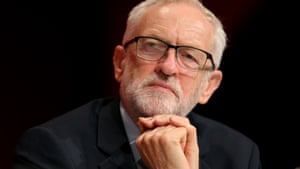The Guardian - Back to home
The failed Watson plot exposes what really scares Corbyn and his coterie
Sun 22 Sep 2019 03.00 EDT
 ‘If people want to remove me, let the members remove me’: Labour’s deputy leader, Tom Watson. Photograph: Toby Melville/Reuters
‘If people want to remove me, let the members remove me’: Labour’s deputy leader, Tom Watson. Photograph: Toby Melville/Reuters
O
n the eve of the Labour conference, a poll was published that gave Jeremy Corbyn a negative personal approval rating of minus 60 points – yes, you read that right, minus 60 points. These are depths of unpopularity never plumbed by any opposition leader in the more than 40 years that pollsters have been recording this figure. Even Michael Foot wasn’t that disliked by the British public in the run-up to Labour’s landslide defeat at the hands of Margaret Thatcher in 1983. To have a candidate for prime minister who is that repellent to the country is a problem for Labour, especially when it is facing a general election. To Mr Corbyn’s allies, the answer is obvious – the deputy’s head must roll.
The plot to oust Tom Watson by abolishing his post ought to be shocking and yet it is not that surprising to anyone who has been paying attention to the Labour party since it came under the control of Mr Corbyn and his friends.
The stakes at this conference season are extraordinarily high. The Brexit crisis is coming to some kind of climax and nearly everyone assumes that an election will soon be upon us. The Lib Dems, who are pushing Labour into third place in some polls, put on a show of celebration of their recent successes at their Bournemouth conference. The Tories will strive to seem confidently together when they meet in Manchester next week. Labour was already facing a struggle to mask its divisions during its week in Brighton, not least because the party’s splits about Brexit have not been resolved by the latest tortuous iteration of its policy. Labour’s difficulties in that regard gave the party even more of an incentive, or so you might have thought, to do its best to put on a united face about everything else. The conference ought to be an opportunity to showcase Labour’s programme, present the party as fit to fight that looming election and project themselves as ready for government. Even dissident Labour MPs had decided to be co-operative. Many are staying away from Brighton. Most who have made the trip to the Sussex coast went with the intention of not rocking the boat.
And yet Mr Corbyn’s allies chose this moment, the last Labour conference before an election, to dynamite any pretence of unity and reignite the party’s civil war by conspiring to overthrow Mr Watson. They went about it in the most underhand and yet also clumsy way conceivable. The position of deputy leader, a fixture of Labour’s constitution for many decades, is directly elected by the members. Mr Watson secured the role in 2015 by winning a vote. If they wanted rid of him, there was a democratic way to go about it. That would have been to put up a challenger. “If people want to remove me, let the members remove me,” he told the Today programme on Saturday.
Trying to take him out the democratic way has been discussed in Corbynista circles in the past. Deciding it was too difficult to pull off, they instead tried to “disappear” him in a way that recalled how Stalin’s henchmen would have politburo members who had incurred the displeasure of the Soviet dictator airbrushed from photographs.
The move to abolish the deputy leadership was made with no advanced discussion or even notice. Nor was there any pretence that this was motivated by anything other than a desire to evaporate someone for expressing opinions Mr Corbyn doesn’t like. It was not on the agenda of the meeting of the national executive committee on Friday night, but sprung on the party’s governing body at the last minute. Mr Watson was not present. The first warning he received was via a text message while he was having dinner with his son at a Chinese restaurant in Manchester. In the wake of the conspiracy’s failure, the Labour leader’s spinners are briefing – and I am struggling to type this without fainting in disbelief – that Mr Corbyn himself did not know that his own capos were going to attempt a drive-by shooting of his deputy.
The plot was undone by the scale of the backlash from MPs, shadow cabinet members, senior trade unionists and former Labour leaders. Even some Corbyn loyalists on the frontbench thought it madness and told him so. This ultimately impelled him to tell his gang to holster their weapons. There will instead be “a review” of the role of deputy; they still want his scalp.
Mr Watson broadly speaks for the centre-left Labour tradition that was dominant in the party’s history until the Corbynite takeover and that’s one of the things they can’t stand about him. They were paranoically angry when he set up an internal party group, Future Britain, to gather together non-Corbynite Labour people. He did that after a series of defections by Labour MPs and saw it as a way to stem further losses by offering a safe place for social democrats within the party; Corbynite zealots viewed it as treachery to the Dear Leader.
The deputy leader has been increasingly bold in demanding that Labour adopts a much more robust stance on Brexit, expressing a view widely supported by Labour MPs, many of whom share his fear that the party will be severely punished at the election if it remains equivocal on the defining issue of our time. The leader and his coterie hate Mr Watson not so much for what he says but because he is a lot more representative of the anti-Brexit views of the majority of Labour supporters than is Mr Corbyn. No one is allowed to get between the leader and the adoration of the members by expressing a view that is more popular with them.
To compound the Corbynite charge sheet of heresy and deviancy, Mr Watson has taken a vigorous stand about the party’s failure to deal with antisemitism in its ranks.
It’s not just business. It’s also personal. A key player in the scheme was Len McCluskey, the general secretary of Unite, whose clout flows from the fact that his union is the party’s largest donor and the leader’s coterie is populated with his close associates. Once such good friends that they shared a flat together, he and Mr Watson have long been locked in a bitter feud. There’s no loathing so deep as that between former flatmates who have fallen out.
There are also some less obvious dimensions to the anti-Watson plot, the public face of which was Jon Lansman, the chairman of Momentum. I think it is also an expression of a furious frustration that other schemes to eliminate critics, purge dissent and tighten their control of the party have not been going entirely to plan. Non-Corbynite Labour MPs are being exposed to a leadership-sanctioned and Momentum-organised effort to have them deselected and replaced with more compliant candidates for the election. This began at the beginning of September and the results are starting to come through. In much greater numbers than was anticipated, Labour MPs, including astringent critics of Mr Corbyn’s leadership, have been defeating attempts to evict them from their seats. Some have been reconfirmed as candidates by substantial margins, worrying the Corbynites that their control over the party membership is weakening.
If Labour is again rejected by the country, it is almost certain that Mr Corbyn, who will then be a two-time election loser, will have to go. Even some of his most fervent admirers will conclude that he cannot carry on as leader. His departure will trigger a titanic struggle for the soul of the party. So another, and I think correct, way of reading the failed anti-Watson plot is as a sign of how much they fear losing control. When you might expect all the focus to be on winning the election, the Corbynite left are desperate to tighten their grip on the party for fear it will be broken by another election defeat.
Authoritarian attempts to stifle dissent, ferocious sectarianism and heavy-booted stamping on the tolerant traditions of our democracy are not confined to Labour. Over in the increasingly noxious Tory party, MPs are being deselected by Brexit ultras in their constituencies, and Boris Johnson purged 21 Conservative MPs, including several former cabinet ministers, for opposing a crash-out Brexit. His enforcer, Dominic Cummings, summarily sacked an aide to the chancellor for “disloyalty” and then had her marched out of Number 10 by armed police officers.
 This is a big and poisonous change in the culture of British politics. Both the Conservatives and Labour used to be proud to call themselves broad churches, capable of encompassing and speaking for many strands of opinion and they made that central to their appeal to the electorate. Now both are behaving like viciously intolerant sects.
This is a big and poisonous change in the culture of British politics. Both the Conservatives and Labour used to be proud to call themselves broad churches, capable of encompassing and speaking for many strands of opinion and they made that central to their appeal to the electorate. Now both are behaving like viciously intolerant sects.
• Andrew Rawnsley is Chief Political Commentator of the Observer
------------------------------------------------------------------
·
RobertBleeker
01
One can not
seriously analyse the latest developments around Watson without (even remotely)
mentioning the row on antisemitism, whereby Watson
stood in the forefront to undermine the position of the pro-BDS Corbyn. Period.!
Share


Geen opmerkingen:
Een reactie posten
Opmerking: Alleen leden van deze blog kunnen een reactie posten.